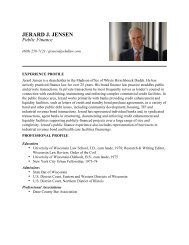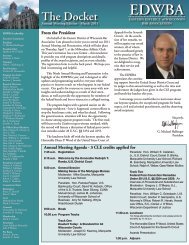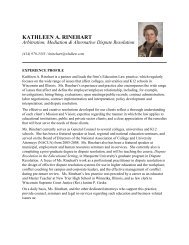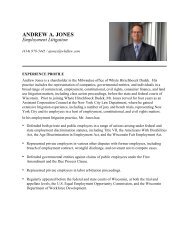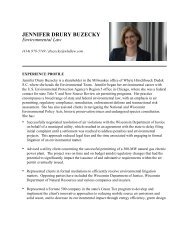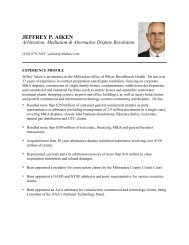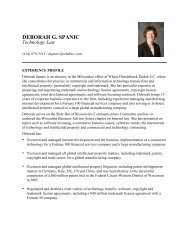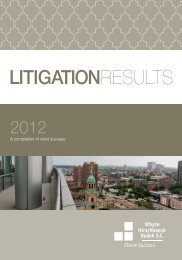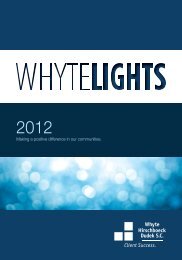FORETHOUGHT - Whyte Hirschboeck Dudek SC
FORETHOUGHT - Whyte Hirschboeck Dudek SC
FORETHOUGHT - Whyte Hirschboeck Dudek SC
You also want an ePaper? Increase the reach of your titles
YUMPU automatically turns print PDFs into web optimized ePapers that Google loves.
PUNITIVE CONSEQUENCES:<br />
UNINSURED WORKER’S<br />
COMPENSATION PENALTY<br />
CLAIMS AGAINST EMPLOYERS<br />
Written by<br />
Maryeve Heath and<br />
Mary Beth Hughes<br />
2013 is here and, unfortunately,<br />
the economic outlook is not much<br />
better than 2012. One of the biggest<br />
consequences for employers in the<br />
worker’s compensation arena is an<br />
increase in the value of worker’s<br />
compensation claims. There are a number<br />
of ways this occurs, but one of the most<br />
dangerous and potentially overlooked<br />
ways is through penalty claims pursued<br />
directly against employers. There are<br />
four different penalty claims an employee<br />
may pursue against his or her employer,<br />
all of which are uninsurable under a<br />
worker’s compensation policy. This means<br />
the employer bears the full burden of<br />
defending the claim, including hiring an<br />
attorney and paying its own defense<br />
costs, as well as paying for any judgment<br />
or settlement. It is important to note,<br />
however, that the employee may only<br />
prevail in any of these claims after proving<br />
the existence of a compensable, workrelated<br />
injury. Following are descriptions of<br />
the potential penalty claims that may be<br />
pursued by an injured employee.<br />
1. Bad Faith: Wisconsin Statutes<br />
§ 102.18(1)(bp)<br />
If the employer (or insurance carrier)<br />
suspends, terminates, fails to make<br />
payments or fails to report an injury as a<br />
result of malice or bad faith, the penalty is<br />
200% of compensation, including medical<br />
expenses, up to a maximum of $30,000 for<br />
each act of bad faith. The Department of<br />
Workforce Development (DWD) regulation,<br />
§ DWD 80.70, defines “malice or bad<br />
faith” in two ways: (1) where the employer<br />
unreasonably refuses or unreasonably fails<br />
to report an alleged injury to its worker’s<br />
compensation carrier; or (2) where the<br />
self-insured employer or insurance carrier<br />
unreasonably fails to make payment or<br />
unreasonably suspends or terminates<br />
payments without credible evidence<br />
demonstrating that the claim for payments<br />
is fairly debatable. Under Wis. Stat. §<br />
102.22(1), the “delayed payment penalty”<br />
statute, if the employer or insurance carrier<br />
“inexcusably” fails to pay, a penalty of<br />
10% of the delayed compensation can be<br />
awarded. The two penalties may not be<br />
awarded concurrently.<br />
2. Unreasonable Refusal to Rehire:<br />
Wisconsin Statute § 102.35(3)<br />
If an employee sustains a work-related<br />
injury and the employer refuses to rehire<br />
that employee without reasonable cause,<br />
where suitable employment is available<br />
within the employee’s physical and<br />
mental limitations, the employer may<br />
have exclusive liability to pay the wages<br />
lost during the period of refusal, with a<br />
maximum exposure of one year’s wages.<br />
Yet, the Worker’s Compensation Act does<br />
not require the employer to create a job.<br />
The statute also applies to the situation<br />
where an employee is hired back to work<br />
by the employer, but is subsequently<br />
terminated. When the employer<br />
determines its duty to bring an employee<br />
back to work after a work-related injury,<br />
it should not overlook the employer’s<br />
obligations under the Family and Medical<br />
Leave Act, Americans With Disabilities<br />
Act, and Wisconsin Fair Employment Act.<br />
3. Violation of Safety Provisions:<br />
Wisconsin Statutes § 102.57<br />
If an injury is caused by the failure of the<br />
employer to comply with any statute,<br />
HUMAN RESOURCES 21



